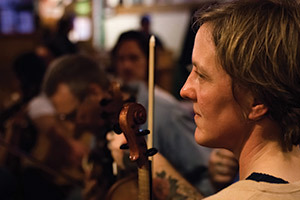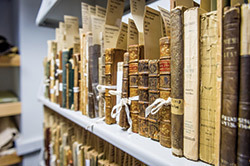 Liz Dube
Liz Dube
Preservation follows Liz Dube around.
Dube wasn’t sure what she wanted to do with her English major until she started working at a library. “I volunteered in the collections/development department to see what it was like, and the conservation lab was right next to them behind a glass wall. I always found myself peeking over, thinking ‘What’s going on in there? That looks really interesting!’”
Eventually her fascination took her to graduate school for preservation in Austin, Texas, and then to the Hesburgh Libraries Conservation Lab. Originally she just planned to stay three to five years, but 17 years later she’s still here, and still preserving Notre Dame’s collections.

“It’s a good fit here,” she says.
Living in South Bend has also opened other doors for her. In 2008, a banjo showed up in her life, and she started teaching herself how to play it. “It was a new challenge, something to do,” she recalls, “and then after a year I was looking for a teacher. I met an old-time banjo player at Fiddler’s Hearth, so I went up and asked him if he knew of anyone teaching, and he said, ‘Well, you should come here if you play the banjo, on Tuesday nights; we have an old-time music session then.’ I said ‘I’ll come listen.’ So I did, and I kept coming back, and they kept saying ‘Bring your banjo!’ I finally got up the nerve and played in the back of the group. Slowly but surely, I kept coming closer to the front. And now, I’m there every week.”
Today, she is very involved in the music scene at Fiddler’s and across South Bend, picking up new skills and instruments as she goes along. She not only has several banjos that she plays in multiple styles, now she also plays guitar and fiddle and even sings.
“Singing is a lot of fun,” she says. “I never thought I had a voice, but it turns out everyone can sing, I think. You just have to sing yourself through the bad singing and find your voice. Most of this I wouldn’t have seen myself doing.”
In both Dube’s music and her work, one thread runs strong: preservation. Her interest in going back to the roots of a thing also shows through as she talks about her favorite songs and styles. The African influences in Americana music, especially, interest her. It’s those rhythms and beats that fascinate her, and what she listens for in her favorite songs and instrumentation.
“Every day, what I do is help preserve cultural artifacts and historical documents, and so my interest in that is perhaps related to my interest in preserving the older music — going back and chasing down older tunes, and bringing them back to life, playing them again, communicating and sharing them.”
As she keeps the old music alive, Dube also finds herself preserving the human connection so inherent in the style.
“It’s social music, for sure. That’s what’s really kept me with it. It’s a way of interacting and sharing. It’s not stage music, it’s not performance music; it’s participatory.”
She loves to play at the South Bend Farmer’s Market and on the streets of South Bend, where she can watch as the people listening catch the rhythms that have caught her.
“It’s the perfect setting for our music. I love it when kids start dancing in the street when we play,” she smiles. “You know when you see someone nodding their head to the beat, or tapping their toes, that you’re doing something right. That’s what it’s all about.”
You can listen to Dube play on Tuesday nights at Fiddler’s Hearth in South Bend, starting at 7:15 p.m.
Contact: Tara O’Leary, Hesburgh Libraries, toleary2@nd.edu